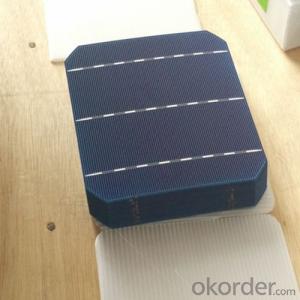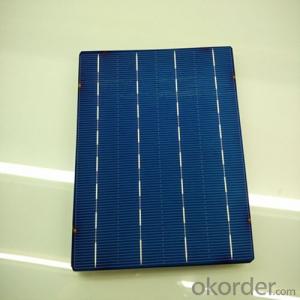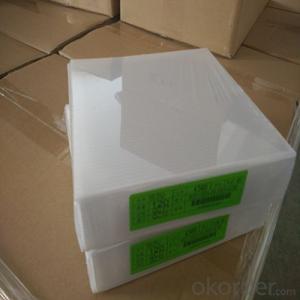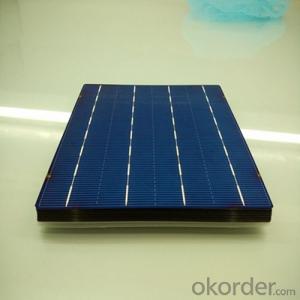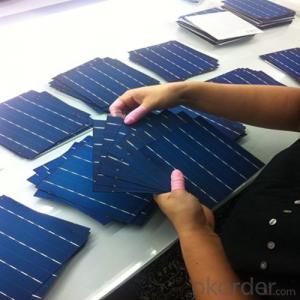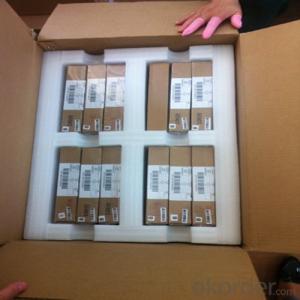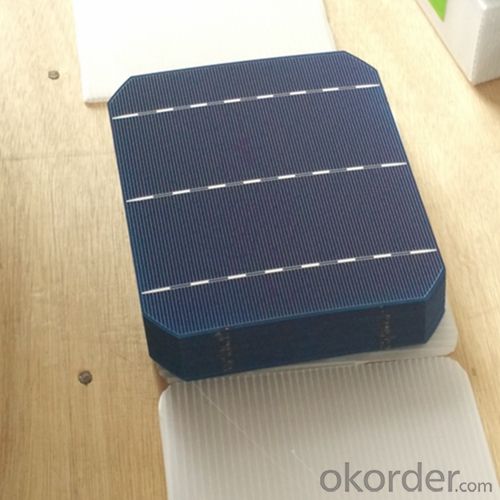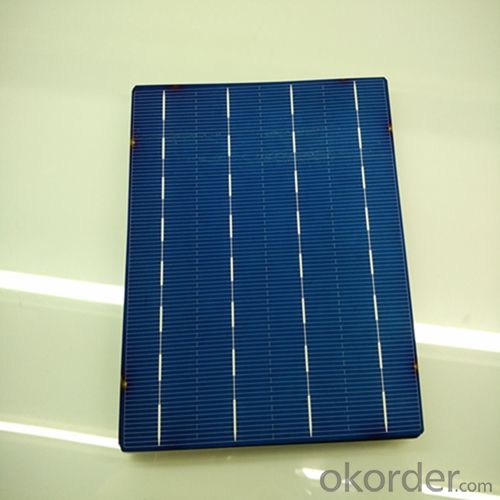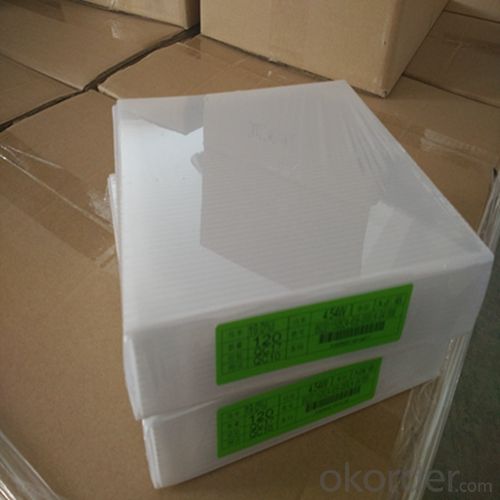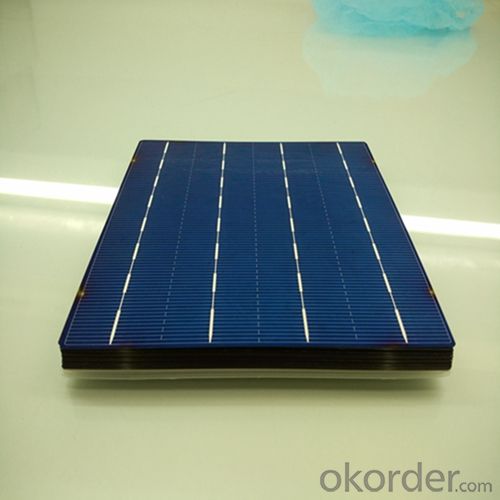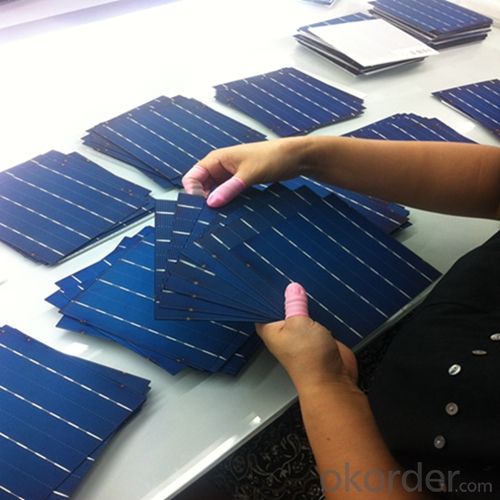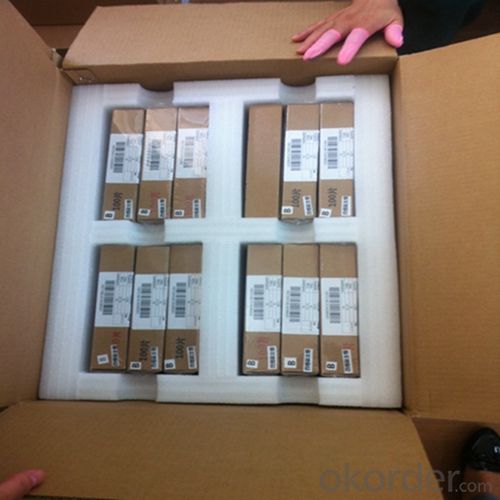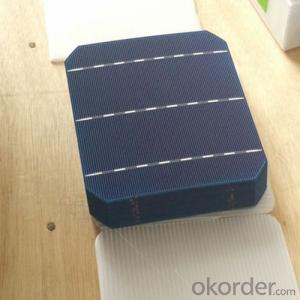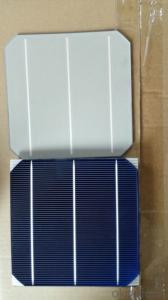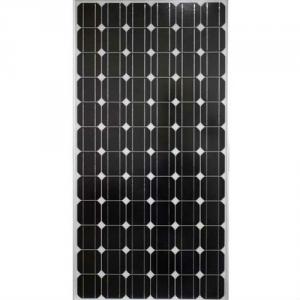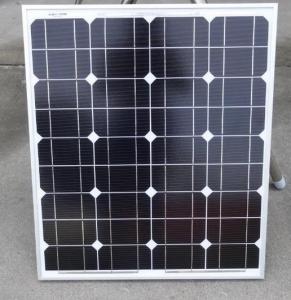Martin Green Solar Cells - Poly 156x156mm2 Solar Cells Made
- Loading Port:
- Shanghai
- Payment Terms:
- TT OR LC
- Min Order Qty:
- 6000 watt
- Supply Capability:
- 650000 watt/month
OKorder Service Pledge
OKorder Financial Service
You Might Also Like
Benefits of Solar Power:
Now is a great time to go solar and harvest the power of the sun. Here is our top ten list of the benefits to installing solar power:
When installed, solar energy is free – no resources are consumed
Help to lessen our dependence on heavily polluting coal power stations
Fossil fuels can't last forever, future generations will appreciate the effort
Characteristic of Mono 156X156MM2 Solar Cells
You are gaining energy independence - add battery backup power for even greater energy security
The cost of electricity is only going to rise – insure against that rising cost
Quality solar power and water adds value and appeal to your home
Specifications of Mono 156X156MM2 Solar Cells
Solar PV systems are easily upgraded in future - aim to make your house a net energy producer!
Solar panels offer a long lifetime of low maintenance service, maybe 30-40 years
Your friends will think you're great!
You'll feel great for doing your bit for the environment!
Mechanical data and design
Format | 156mm x 156mm±0.5mm |
Thickness | 210μm±40μm |
Front(-) | 1.5mm bus bar (silver),blue anti-reflection coating (silicon nitride) |
Back (+) | 2.5mm wide soldering pads (sliver) back surface field (aluminium) |
Temperature Coefficient of Cells
Voc. Temp.coef.%/K | -0.35% |
Isc. Temp.coef .%/K | +0.024%/K |
Pm.Temp.coef. %/K | -0.47%/K |
Electrical Characteristic
Effiency(%) | Pmpp(W) | Umpp(V) | Impp(A) | Uoc(V) | Isc(A) | FF(%) |
18.35 | 4.384 | 0.526 | 8.333 | 0.63 | 8.877 | 78.39% |
18.20 | 4.349 | 0.526 | 8.263 | 0.63 | 8.789 | 78.54% |
18.05 | 4.313 | 0.525 | 8.216 | 0.63 | 8.741 | 78.32% |
17.90 | 4.277 | 0.524 | 8.161 | 0.625 | 8.713 | 78.04% |
17.75 | 4.241 | 0.523 | 8.116 | 0.625 | 8.678 | 77.70% |
17.60 | 4.206 | 0.521 | 8.073 | 0.625 | 8.657 | 77.36% |
17.45 | 4.170 | 0.519 | 8.039 | 0.625 | 8.633 | 76.92% |
17.30 | 4.134 | 0.517 | 8.004 | 0.625 | 8.622 | 76.59% |
17.15 | 4.096 | 0.516 | 7.938 | 0.625 | 8.537 | 76.80% |
17.00 | 4.062 | 0.512 | 7.933 | 0.625 | 8.531 | 76.18% |
16.75 | 4.002 | 0.511 | 7.828 | 0.625 | 8.499 | 75.34% |
16.50 | 3.940 | 0.510 | 7.731 | 0.625 | 8.484 | 74.36% |
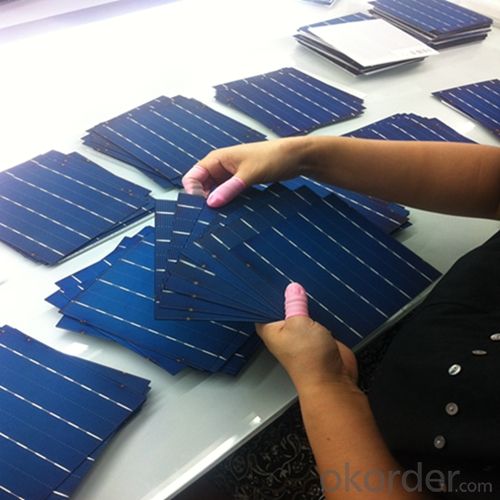
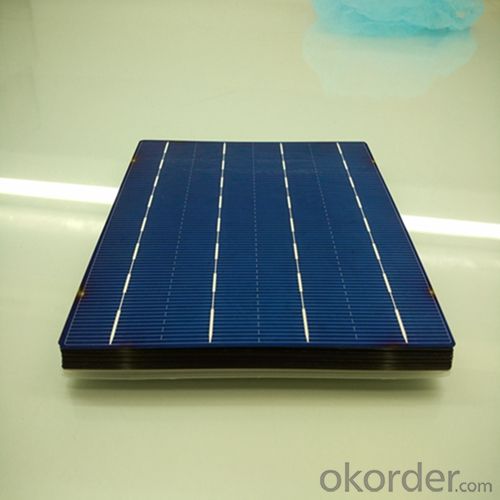
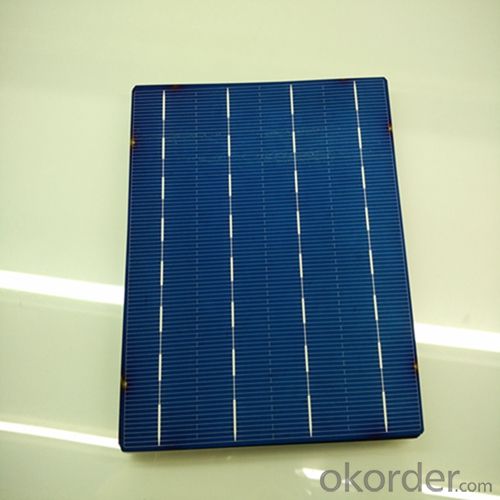
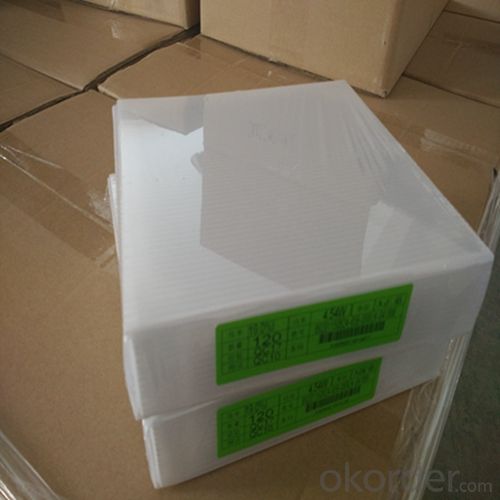
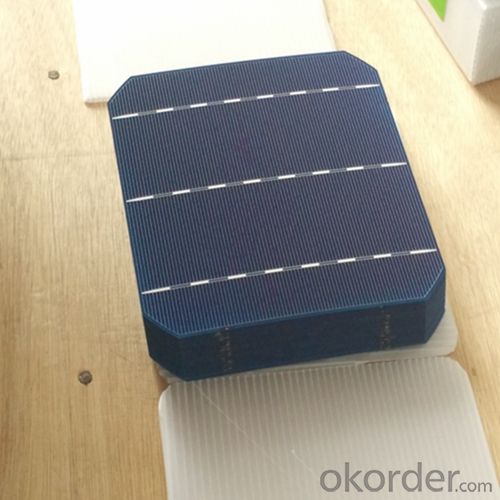
FAQ
Q: What price for each watt?
A: It depends on the quantity, delivery date and payment terms, generally Large Quantity and Low Price
Q: What is your size for each module? Can you tell me the Parameter of your module?
A: We have different series of panels in different output, both c-Si and a-Si. Please take the specification sheet for your reference.
Q: What is your size for each module? Can you tell me the Parameter of your module?
A: We have different series of panels in different output, both c-Si and a-Si. Please take the specification sheet for your reference.
- Q: How long is the long cycle solar cell life?
- Various solar cells according to its working principle, life is different (1) silicon solar cells Silicon solar cells are divided into three kinds of monocrystalline silicon solar cells, polycrystalline silicon thin film solar cells and amorphous silicon thin film solar cells.
- Q: Can solar cells be used in sports stadiums?
- Yes, solar cells can be used in sports stadiums. They can be installed on the roofs or facades of stadiums to generate renewable energy, reducing the reliance on traditional sources of electricity. This can help lower operating costs and reduce a stadium's carbon footprint. Additionally, solar cells can provide shade in outdoor stadiums, enhancing the spectator experience.
- Q: What is the cost of producing a solar cell?
- The cost of producing a solar cell can vary depending on various factors such as the type and size of the cell, manufacturing technology, materials used, and economies of scale. On average, the cost ranges from $0.15 to $0.40 per watt for the production of a standard crystalline silicon solar cell. However, with advancements in technology and increasing global demand, the cost has been steadily decreasing over the years.
- Q: What is the impact of dust and dirt on solar cell efficiency?
- Dust and dirt can significantly reduce the efficiency of solar cells. When dust accumulates on the surface of solar panels, it creates a barrier that inhibits the penetration of sunlight, thereby reducing the amount of energy that can be converted into electricity. Additionally, dirt particles can cause shading effects and create hotspots, which further decrease the overall efficiency of the solar cells. Regular cleaning and maintenance of solar panels are crucial to keep them operating at their maximum potential.
- Q: Can solar cells be used in hotels?
- Yes, solar cells can be used in hotels to generate renewable and clean energy. They can be installed on the roofs or other suitable areas of hotels to capture sunlight and convert it into electricity, reducing the reliance on traditional energy sources and lowering utility costs.
- Q: Can solar cells be used for powering wildlife tracking devices?
- Yes, solar cells can be used for powering wildlife tracking devices. Solar cells convert sunlight into electrical energy, which can be stored in batteries and used to power various devices, including wildlife tracking devices. This allows for continuous and sustainable power supply, eliminating the need for frequent battery replacements or recharging.
- Q: Can solar cells be used for powering electric vehicle charging stations?
- Yes, solar cells can be used for powering electric vehicle charging stations. Solar panels can convert sunlight into electricity, which can then be used to charge electric vehicles. This renewable energy source is ideal for charging stations as it reduces reliance on traditional power grids and reduces carbon emissions.
- Q: Can the solar powered cells really work better than the normal cells?
- Yes, it does work much better than the normal cells, but the solar powered cells also has its disadvanges.
- Q: How do solar cells perform in areas with extreme temperature fluctuations?
- Solar cells typically perform well in areas with extreme temperature fluctuations. However, excessive heat can slightly reduce their efficiency, while extreme cold can temporarily decrease their power output. Nonetheless, solar cells are designed to withstand a wide range of temperatures, and advancements in technology have improved their performance and durability in extreme weather conditions.
- Q: Which brand of the solar cells is sold with the lower price on the market? Which brand is more practical for the countryside?
- Well, it depends on how many and how big is your project. The more you want, the cheaper it is.
Send your message to us
Martin Green Solar Cells - Poly 156x156mm2 Solar Cells Made
- Loading Port:
- Shanghai
- Payment Terms:
- TT OR LC
- Min Order Qty:
- 6000 watt
- Supply Capability:
- 650000 watt/month
OKorder Service Pledge
OKorder Financial Service
Similar products
Hot products
Hot Searches
Related keywords
